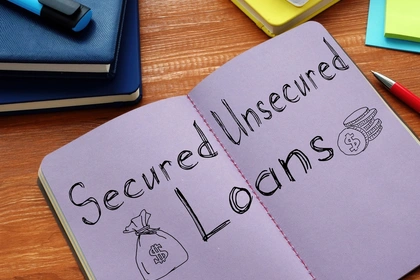What is a secured debt consolidation loan?
A secured debt consolidation loan is designed to help homeowners move some or all their debt into one loan that is tied to their property. This is why it is also known as a homeowner loan.
Using your property as collateral provides a safety net for the lender. As a result, you may find it easier to get approved for a secured loan. And you might get a lower interest rate, even if you have a bad credit score. However, if you default on the loan, as a last resort, the lender could repossess your property.
What is an unsecured debt consolidation loan?
An unsecured debt consolidation loan, or personal loan, can also be used to consolidate debt. But unlike a secured loan, you don’t need any collateral to apply. If you are a homeowner, your property won’t be at risk if you miss payments. However, your credit file will still be damaged if you default on the loan.
Personal loans represent more risk for lenders than secured loans. So, interest rates tend to be higher, and you may find it harder to qualify if you have a poor credit score.
Should I choose an unsecured or secured debt consolidation loan?
The best loan option for you will depend on several factors, including whether you own your home, and:
- your individual circumstances
- your credit score
- the amount you want to borrow
- how long you want to repay the loan
Here’s a handy comparison table:
| Unsecured loan | Secured loan |
| You don’t need to be a homeowner, and your home won’t be at risk if you default on the loan. | You do need to be a homeowner, and your property will be at risk if you fall behind on your loan repayments. |
| The best rates are usually available | You may find it easier to get approved, even if you have a poor credit history. |
| The interest rate may be higher than on a secured loan. | The interest rate may be lower than on an unsecured loan. |
| Loan amounts tend to be lower and loan terms are usually shorter. | Loan amounts tend to be higher and loan terms are usually longer. |
Taking out either type of consolidation loan could mean one monthly payment and one interest rate. You may be able to spread your repayments over a longer period to achieve lower monthly outgoings. But extending your loan term may increase the amount you repay in total.
Can I qualify for a debt consolidation loan without collateral?
You can use an eligibility checker to see if you qualify for a debt consolidation loan, without affecting your credit score. Your eligibility depends on your individual circumstances and the lender.
You won’t qualify for a secured consolidation loan if you don’t have any collateral. But you may qualify for an unsecured loan.
Each lender has different criteria, but most will ask you for:
- your personal details – full name, date of birth, and address history
- employment information – name of employer, occupation, and income
- amount you want to borrow
- reason for applying
Required documentation may include:
- proof of ID – such as a passport or driving licence
- proof of address – such as recent utility bills
- proof of income – e.g., recent payslips or bank statements
When you apply for a loan, the lender will perform a hard credit check of your credit file. This helps them gauge your creditworthiness based on your past financial behaviour. A hard check will show up on your report, and it may cause a temporary dip in your credit score.
To qualify for an unsecured consolidation loan, the lender may also look at your debt-to-income ratio. This gives them an idea of your affordability based on how much you owe compared to your monthly income.
It can be more difficult to get approved if you have a poor credit history, but it’s not impossible. However, lenders may charge higher interest rates to balance out the risk they are taking.
How can I improve my chances of qualifying for debt consolidation with no collateral?
While there is no set formula that can guarantee loan approval, there are steps you can take to improve your chances:
- Improve your credit score – by making payments on time, registering on the electoral roll, and limiting spending on credit cards.
- Make a budget and cut unnecessary costs – this could help you get on top of your finances and improve your affordability for a loan.
- Look for lenders or brokers that offer loans for – every lender has different eligibility requirements, and some accept those with a thin or poor credit history.
Can I consolidate my debt with bad credit?
Yes, if you have bad credit, it might still be possible to consolidate your debt. However, you may be offered higher interest rates and smaller loan amounts. And in some instances you may need a guarantor to qualify.
Can I consolidate my debt without a loan?
Yes, here are other options to consider:
- Balance transfer credit card – you could consolidate multiple credit card debts by transferring the balances onto a new credit card with a low or 0% APR. A good credit score may be required to qualify.
- Contact your creditors – if you’re struggling to keep up with your debt repayments, your creditors could help. You can try to negotiate a new rate, change the payment date, or ask them to temporarily pause your repayments. Keep in mind that interest (and potentially other charges) will likely continue to accrue during payment breaks. Any reduced payments can affect your credit score.
- Use any available cash savings – consider paying down your debts by either focusing on the smallest amounts first or tackling those with the highest APR.
- Explore debt management solutions – if you’re struggling with debt, you can access free financial advice and support from a professional debt specialist. Visit Money Wellness, StepChange, Citizens Advice, National Debtline, or MoneyHelper to find out more.
Loans for all purposes from £1,000 to £500,000
- Get a decision online
- Know your rate before you apply
- Comparing won't affect your credit score
Intelligent Lending Ltd is a credit broker, working with a panel of lenders. Homeowner loans are secured against your home.

Disclaimer: We make every effort to ensure content is correct when published. Information on this website doesn't constitute financial advice, and we aren't responsible for the content of any external sites.






